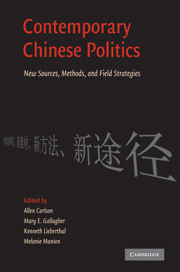Book contents
- Frontmatter
- Contents
- Tables and Figures
- Contributors
- Abbreviations
- Introduction
- Part I Sources
- Part II Qualitative Methods
- Part III Survey Methods
- 10 A Survey of Survey Research on Chinese Politics
- 11 Surveying Prospects for Political Change
- 12 Using Clustered Spatial Data to Study Diffusion
- 13 Measuring Change and Stability over a Decade in the Beijing Area Study
- 14 Quantitative Research and Issues of Political Sensitivity in Rural China
- Reflections on the Evolution of the China Field in Political Science
- Glossary
- References
- Index
10 - A Survey of Survey Research on Chinese Politics
What Have We Learned?
Published online by Cambridge University Press: 05 June 2012
- Frontmatter
- Contents
- Tables and Figures
- Contributors
- Abbreviations
- Introduction
- Part I Sources
- Part II Qualitative Methods
- Part III Survey Methods
- 10 A Survey of Survey Research on Chinese Politics
- 11 Surveying Prospects for Political Change
- 12 Using Clustered Spatial Data to Study Diffusion
- 13 Measuring Change and Stability over a Decade in the Beijing Area Study
- 14 Quantitative Research and Issues of Political Sensitivity in Rural China
- Reflections on the Evolution of the China Field in Political Science
- Glossary
- References
- Index
Summary
In a political environment that remains (at best) officially skeptical about the enterprise, representative sample surveys on Chinese politics have nonetheless grown substantially in number in the past two decades: political scientists trained and based outside mainland China conducted a mere two such surveys in the 1980s, but the number increased more than tenfold in the 1990s and continues to rise steadily. By mid-2008, some sixty articles, books, and book chapters drawing from original representative sample surveys on Chinese politics had appeared – including many articles in top-tier journals of political science and area studies alike. This chapter surveys the surveys and their products. It briefly explains the focus here on probability sample surveys and describes the changing regulatory context within which researchers conduct their surveys. Most of all, it evaluates their achievements, with attention to their cumulativeness, contributions to knowledge, and fit in Chinese area studies. The chapter is not a primer on the conduct of survey research on Chinese politics in mainland China. It is instead a status report and reflection on this research, aimed as much (or more) at its consumers (and nonconsumers) as at survey researchers themselves.
From the corpus of English-language monographs and peer-reviewed journal articles authored by political scientists and published in nonmainland sources through mid-2008, I identify studies that exploit original probability sample survey data. In coauthored works, I include studies that meet these criteria so long as at least one of the authors is a political scientist. I have surely missed some relevant surveys in my search – but not, I think, any represented in studies published in major journals of political science or Chinese area studies or organized by any of the roughly half-dozen major players in the enterprise of survey research on Chinese politics. I focus in this chapter on original surveys, not the small literature by political scientists who analyze datasets produced wholly or mainly by others. At the same time, the paucity of studies analyzing existing datasets is a sign of the relative immaturity of survey research on Chinese politics, a topic that merits discussion and is taken up below.
- Type
- Chapter
- Information
- Contemporary Chinese PoliticsNew Sources, Methods, and Field Strategies, pp. 181 - 199Publisher: Cambridge University PressPrint publication year: 2010
- 19
- Cited by



